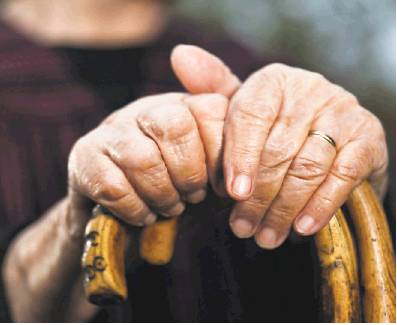AGING
Take control of the end of your life
Don’t leave it to others to decide how you spend your final days
By Katy ButlerIn five years, the first of 77 million of my fellow Baby Boomers will hit 80, when frailty becomes almost normal. Forty percent of us will need help getting through the day. A quarter will suffer memory loss. And if my parents’ history is anything to go by, I have a 50-50 chance of being one of them.
My beloved father, who developed vascular dementia after a stroke at age 79, forgot how to use a phone or find his way home. In his final year of life, he couldn’t remember the name of one of his three children. Once warmhearted, generous and loving, he became querulous, anxious and incapable of empathy. The strain of looking after him full time, while mourning his emotional disappearance, challenged the sanity and damaged the health of my far-healthier, sharp-as-a-tack mother.
If there was one silver lining in this difficult, prolonged decline, it was this: It encouraged me to think explicitly about the moral challenges posed by dementia. Dementia is not an individual tragedy. It is a family illness, rippling out in ever-widening circles of financial and practical burden, exhaustion and ambiguous loss. It’s a terminal illness, but it moves so glacially that its sufferers often have trouble qualifying for hospice. Many linger for years on lockdown units, deprived of a peaceful dying by ill-considered, sometimes harrowing, medical interventions. Any discussion of our medical wishes should go beyond legalistic thinking and consider the lives of others.
With that in mind, I believe that “comfort care only” is what I want if dementia renders me incapable of caring for myself. It’s a decision I want to make now, with a clear head, just as Ulysses did when he tied himself to the mast of his ship to resist the calls of the sirens.
So I have written the following letter — couched in commonsense language rather than medicalese — as an amendment to my advance health care directive. It won’t guarantee me a swift and timely death, but it might remove some obstacles to it. I’ve sent it to everyone who may become my guardian, caregiver or medical decision-maker. I want to free those I love from guilt, and that is more important to me than whether medical staff consider it legally binding. I looked upon writing it as a sacred and moral act. I invite you to adapt it to your wishes and hope it brings you, and those whom you love, the peace and clarity it has brought to me.
Dear Medical Advocate:
If you’re reading this because I have dementia, please understand I don’t wish to prolong my living or dying, even if I seem relatively happy and content. At the moment that I’m writing this, I’m a fully functioning moral human being, capable of empathy, and eager to protect those I love from burden and misery. If I develop dementia — which is a terminal illness — I may care only about myself. So please let my wishes as stated below guide you.
They are designed to give me “comfort care only,” let nature take its course, free you, and allow me a timely death.
I wish to remove all barriers to a natural death.
Please ask my medical team to provide Comfort Care Only.
Try to qualify me for hospice, and if that fails, ask for palliative care.
I do not wish any attempt at resuscitation. Ask my doctor to sign a Do Not Resuscitate Order and order me a Do Not Resuscitate bracelet from Medic Alert Foundation.
Ask my medical team to allow natural death. Do not authorize any medical procedure that might prolong or delay death.
Do not transport me to a hospital. I prefer to die in the place that has become my home.
Do not intubate me or give me intravenous fluids. I do not want treatments that may prolong or increase my suffering.
Do not treat my infections with antibiotics — give me painkillers instead.
Ask my doctor to deactivate all medical devices that may delay my death, such as a defibrillator or pacemaker, even if a doctor argues that they might keep me more comfortable.
Ask to stop, and do not agree to start, dialysis.
Do not force or coax me to eat, or authorize a feeding tube for me, or put me on “thickened liquids” to reduce my risk of developing pneumonia. Pneumonia was once called “the old person’s friend,” and I see it that way.
Do not agree to tests whose results would be meaningless, given my desire to avoid treatments that might be agitating, painful or prolonging of my life or death.
Do not give me a flu or other vaccine that might delay my death, unless required to protect others.
Do keep me out of physical pain, with opioids if necessary.
Ask my doctor to fill out the medical orders known as POLST (Physician Orders for Life Sustaining Treatment) to confirm the wishes I’ve expressed here.
If I must be institutionalized, please do your best to find a place with an art workshop and access to nature, if I can still enjoy them.
Adapted from “The Art of Dying Well: A Practical Guide to a Good End of Life,” by Katy
Butler © 2019. Reprinted with permission of
Scribner.
Former Chronicle reporter Katy Butler is the author of “The Art of Dying Well,” just released in paperback. She will appear at 7 p.m. Wednesday at Book Passage in Corte Madera, at 7 p.m. Thursday at Copperfield’s Books in Santa Rosa, at 6:30 p.m. Feb. 24 at the Commonwealth Club in San Francisco, at 6:30 p.m. Feb. 27 at the Lafayette Library, and at 6 p.m. March 13 at Yountville Community Center. She is 71 years old and lives in Mill Valley.
